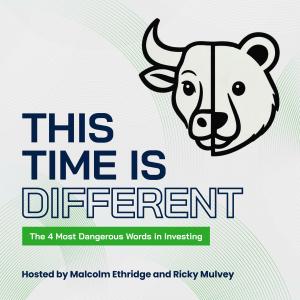This Time Is Different

Latest Episodes
Tech Money Podcast: The Latest on Crypto Regulation with Andie Kramer
In recent years, the rise of digital currencies has revolutionized the way we think about money and finance, with more and more individuals and businesses embracing the potential of blockchain technology. However, with this rapid growth has come a signifi
Tech Money Podcast: How to Know Whether Options Belong in Your Portfolio with Jessica Inskip
Investing is a way to grow your money over time, and secure your financial future. When you invest without a clear plan, you're more likely to make decisions based on emotions, rather than logic. You may be tempted to buy a stock because it's the latest h
Tech Money Podcast: Navigating Money and Divorce with Andrew Hatherley
Nobody enters a marriage expecting to get divorced. Yet, regardless of our best intentions, relationships can and do fall apart. While the emotional roller coaster of divorce is difficult enough, the added frustration of financial litigations can make a s
74. Avoiding Burnout as a Tech Worker with Michael Lin
Picture this: youre working for one of the FANG companies, in a high-paying role, with unlimited PTO, free food, and plenty of responsibility -- sounds pretty ideal right? But theres one big problem: you cant take it anymore. On one hand, you feel guil
73. The Rising Trend of Social Investing with Manning Field
The most common example of social trading is when individual investors follow successful traders on social trading platforms and copy their trades. This can help investors who lack the time, experience, or confidence to invest on their own to achieve simi
72. What Does it Mean to Pay Yourself First?
Traditionally, we are taught from a young age that anyone who fails to pay their bills on time and in full is either irresponsible, lazy, or otherwise bad with money. By the time a person reaches young adulthood, they have essentially learned rule #1 of m
71. Investing in Non-Traditional Real Estate with Whitney Elkins-Hutten
The promise and allure of passive income is undeniable. The idea of making money while you sleep has led to a proliferation of personalities and influencers telling us how to build income streams through dividends, real estate, online courses, e-books,
70. The Impact of Diversity in Fintech with Drew Glover
The Fintech sector is responsible for the rapid transformation and digitalization of financial tools that help consumers intelligently manage and understand their money. Making an incredibly positive impact, financial services companies distance consumers
69. Being Strategic With Your Equity During a Recession with Brooke Harley
Equity is an important aspect of any tech workers overall compensation. This employee perk gives you a stake in the company and incentive to perform. Not only should it be negotiated upon hire, but also leveraged to its full-potential as your career prog
68. Using Technology to Make Estate Planning More Accessible with Martha Underwood
The process of assets changing hands from one generation to the next within a family is what we mean when we use the term "generational wealth." But in actuality, the next generation may not be equipped to manage the money they inherit. However, it is als






 Visit Podcast Website
Visit Podcast Website RSS Podcast Feed
RSS Podcast Feed Subscribe
Subscribe
 Add to MyCast
Add to MyCast